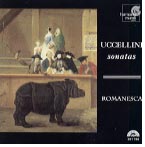If at first you have a hard time finding a historical context for this enchanting, lively, often complex, but always easily listenable music–just keep listening. Violinist Andrew Manze, for whom no challenge seems too daunting, and whose matchless technique enlivens and enriches everything it touches, is the perfect messenger/interpreter for this fascinating selection of sonatas written by an obscure yet strikingly innovative 17th century Italian violinist. In this case the performer bears even more than the usual responsibility, for practically nothing is known about how to perform Uccellini’s music. No autograph manuscripts or personal accounts of performances survive, and the printed copies of scores that do exist are primitive publications whose typographical reliability is difficult to fully determine. Confusing performance directions add to the problem. That doesn’t stop Manze or his very able colleagues from delivering first rate renditions of music that demands the utmost flexibility and imagination. Weird chromaticism, sudden key changes, and shifts of tempo combine with lyrical melodies and improvisatory passages to make for one of the more exciting and unusual programs of Baroque music anywhere.
































